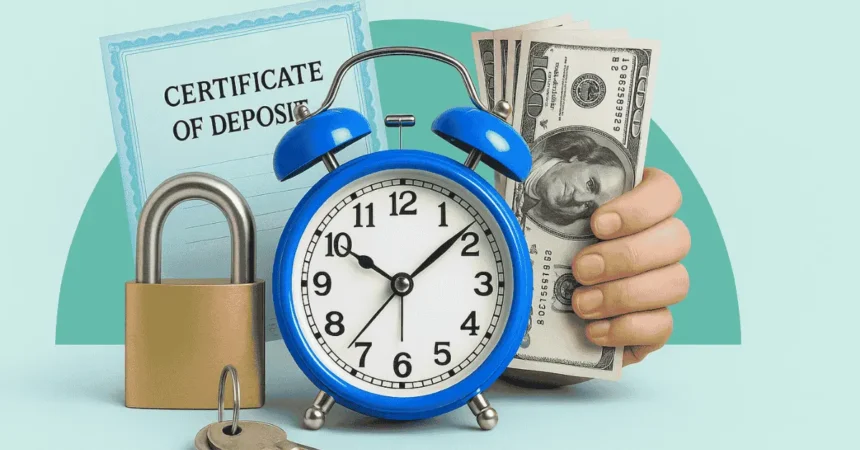If you’re wondering how do certificates of deposit work and how they might help grow your money, you’re not alone. CDs, or certificates of deposit, are often overlooked but can be a solid way to boost your savings without taking much risk. Think of a CD like a savings account that’s a bit more serious about growing your cash, usually offering better interest rates than your typical bank account.
Banks, credit unions, and even some digital-only banks offer CDs that let you lock in a competitive rate — sometimes 4.00% APY or higher — which can be a sweet deal these days. It’s like agreeing to keep your money put for a while and, in return, the bank pays you more interest than usual. Sounds good, right? Whether you’re saving for a rainy day, retirement, or that dream vacation, CDs can be a neat part of your plan.
Even with the Federal Reserve trimming rates a few times in 2024, CDs stayed surprisingly attractive. And with the Fed slowing down rate changes in 2025, this might be a perfect moment to get in.
So how exactly do these certificates of deposit work? Let’s dig into the basics, the types of CDs you can pick from, and what to watch out for when opening one.
How a CD Works
When you put money in a CD, you’re basically agreeing to leave that cash untouched for a fixed amount of time — could be as short as three months, or as long as five years or even more. In exchange, the bank guarantees a fixed annual percentage yield, or APY, so you know exactly what you’ll earn.
Here’s the best part: your deposit and the interest you earn are insured by the FDIC or the NCUA (if you’re using a credit union) for up to $250,000. That means your money is safe, no matter what happens. At credit unions, these are sometimes called share certificates but they work similarly.
The interest you get depends on how long you lock in your money and which bank you choose. Digital banks often offer some of the best rates around, which is worth checking out.
Why CDs Offer Higher Interest
You might be asking, why do CDs pay more than your regular savings account? Well, the catch is you can’t just pull your money out anytime. Since you’re committing to leave the funds for a set term, banks reward that with better interest rates. It’s common for CDs to pay up to ten times what a traditional savings account offers. That’s a big difference.
And unlike savings accounts where rates can jump up and down with the market, CDs give you a fixed rate, so you don’t have to worry about your earnings changing unexpectedly.
Flexible Terms but Penalties Too
CDs come with various term lengths — from just a few months up to a decade. When your CD matures, you get back your original deposit plus the interest it earned. But beware — if you try to withdraw early, most banks hit you with a penalty, usually a few months’ worth of interest. It’s their way of saying “stick to the deal.”
There are exceptions, like no-penalty CDs that let you break your term without fees, but those often come with lower rates or limits on when you can withdraw.
What Happens When Your CD Matures
When the term ends, your bank usually gives you a little window — called a grace period — to decide what to do next, often about a week to 10 days. If you don’t act, they might automatically roll your money into a new CD at the current rate, which could be lower than what you had before.
You can also choose to take your money out, move it to a different account like a high-yield savings account, or start a new CD with a different term. It’s your call.
Minimum Deposits and Adding More Money
Some CDs require a hefty minimum deposit — sometimes a few hundred or even thousands of dollars. But not all banks are that strict. For example, some banks let you open CDs with no minimum, making it easier for anyone to start saving.
Also, keep in mind most CDs only let you deposit once when you open the account. Unlike savings accounts where you can add money anytime, CDs usually lock in your initial deposit. Though there are exceptions, like certain CDs that allow limited additional deposits during the term.
Understanding CD Interest Rates
CD rates are usually fixed, and the APY shows how much you’ll earn in a year including compound interest. Compound interest means you earn interest on both your original deposit and the interest it already earned. Most CDs compound monthly or daily, which means your money grows a bit faster than if the interest was simple.
Benefits of CDs
- Your money is safe and insured up to $250,000.
- You get predictable returns since the interest rate is fixed.
- There’s a range of term options so you can pick what fits your goals best.
Drawbacks to Keep in Mind
- Early withdrawal usually means paying a penalty.
- Your money is locked in, so you might miss out if other investments do better.
- Inflation can eat away at your returns if your CD’s rate is lower than inflation.
How to Open a CD
Opening a CD is usually pretty straightforward:
- Shop around for the best rates, terms, and minimum deposits.
- Apply online or in person. You’ll provide basic info like your Social Security number and ID.
- Fund your CD by transferring money from your checking or savings account.
- Mark your calendar for the maturity date.
- Decide what to do when your CD matures.
7 Types of Certificates of Deposit You Should Know
- Traditional CDs – Fixed interest rates, one-time deposit, fixed term.
- Jumbo CDs – High minimum deposit (usually $100,000+), better rates.
- IRA CDs – Combine CDs with retirement accounts for tax advantages.
- Bump-up CDs – Allows one or more rate increases during the term.
- No-penalty CDs – Withdraw early without penalties but usually lower rates.
- Variable-rate CDs – Interest rate can go up or down with the market.
- Brokered CDs – Sold through brokers, often allow diversification and early selling but can have fees.
How Much Should You Invest?
Before diving in, make sure you have enough cash set aside for emergencies — ideally three to six months of expenses. Remember, early withdrawal penalties can sting, so don’t lock up money you might need soon. If you want flexibility, shorter-term or no-penalty CDs might work better.
One smart strategy is CD laddering. This means spreading your money across multiple CDs with different maturity dates to keep earning good rates while having regular access to cash.
When Might Breaking a CD Make Sense?
Sometimes, it’s worth paying the penalty to break a CD, like if:
- You find a much better interest rate elsewhere.
- You have an emergency and need cash.
- You want to pay off high-interest debt or take advantage of a time-sensitive investment.
Common Questions About CDs
Do I pay taxes on CD interest?
Yes, interest earned on CDs is taxable income. You’ll get a tax form if you earn more than $10 in a year. Retirement account CDs may offer tax benefits though.
How does interest compounding work?
Interest is added back to your principal, so you earn interest on interest. The more frequent the compounding, the better.
Can I open multiple CDs at different banks?
Absolutely! Spreading your money across banks helps you chase better rates and stay within FDIC insurance limits.






